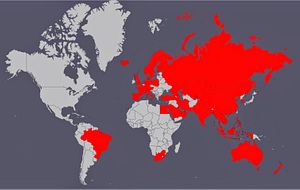This week in China links…
The constitution for the Asian Infrastructure Investment Bank is set to be signed on June 29, Xinhua reports. Representatives from all 57 founding member states will gather in Beijing for the signing ceremony. AIIB members finalized negotiations on the constitution in May; after the document is formally signed, each country will still have to ratify it according to their own domestic processes.
Australia’s treasurer, Joe Hockey, told Sky News that Canberra felt its original concerns about the governance of the bank (concerns shared by the United States, which lobbied allies not to join) had been adequately addressed. “’We are absolutely satisfied that the governance arrangements now in place will ensure there is appropriate transparency and accountability in the bank,” Hockey said. Australia is set to be the AIIB’s sixth largest stakeholder, following China, India, Russia, Germany, and South Korea (in that order).
In other news, it’s that time of year again – time for the U.S. State Department to release its annual human rights report on China (and many other countries, including Afghanistan, Egypt, Ethiopia, India, Iran, Russia, Saudi Arabia, Syria, and Thailand) and for China to retaliate by releasing its human rights report on the United States. The U.S. report concluded that, in China, “Repression and coercion were routine, particularly against organizations and individuals involved in civil and political rights advocacy and public interest issues, ethnic minorities, and law firms that took on sensitive cases.” China’s report, for its part, said that “The U.S. is a country with grim problems of racial discrimination and institutional discrimination against ethnic minorities.” It also pointed out the problem of gun violence.
Over at the BBC, Carrie Gracie tells the story of Xiao Zhang – one woman whose life changed as China’s urbanization process overtook her rural village. While there have been protests from farmers whose land is taken to make way for new cities, Xiao Zhang has embraced the change and its resulting boost to her living standards. “I now know how city people live,” Xiao Zhang says. “Farming is too hard. I will never go back to the way my parents lived and I will never accept that old way of life for my children.” China’s urbanization, personified.
M. Taylor Fravel, writing for the Jamestown Foundation’s China Brief, has an in-depth analysis of China’s new military strategy of “winning informationized local wars,” as revealed in the 2015 defense white paper. China believes that the form of warfare has changed, and its strategy is evolving to keep pace.
Finally, with the U.S.-China Strategic and Economic Dialogue being held in Washington this week, U.S. analysts released a barrage of recommendations about the future of the bilateral relationship. Two in particular are worth a read — and a comparison, as they take opposing positions. Writing for National Review, Michael Auslin argues that the United States should “stop pretending Beijing is a partner” and cancel “failed initiatives” that aim at engagement – such as the S&ED itself. Meanwhile, Jeffrey Bader, a former Obama administration official now with the Brookings Institution, argues against turning China into an enemy through a more confrontational approach to the relationship. “We should not, however, discard the approach taken by eight presidents since Nixon in favor of an assumption of inevitable hostility and a strategy of across-the-board rivalry that may be compelling in international relations theory but which no president has found persuasive,” Bader writes.

































